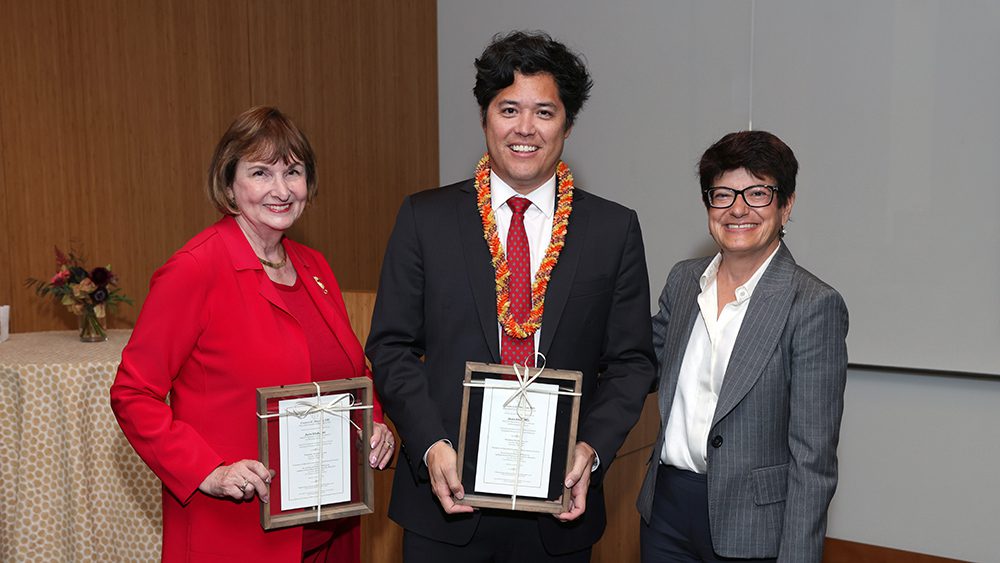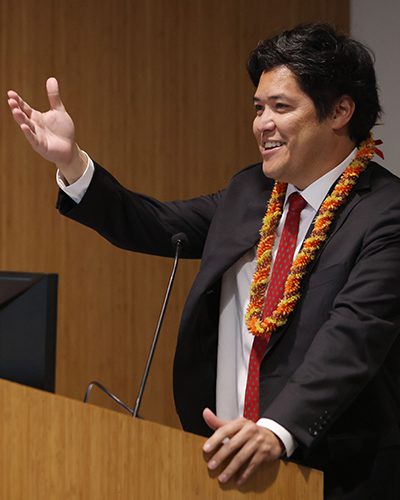In a celebration postponed by COVID-19, Justin Ichida was recognized and honored as the inaugural John Douglas French Alzheimer’s Foundation Associate Professor of Stem Cell Biology and Regenerative Medicine at USC.
By Nate Cernosek

Keck School of Medicine of USC, Dr. Justin Ichida Endowed Professorship Celebration (left to right), Cheryl Mae Craft, Justin Ichida, and Carolyn Meltzer, MD, Dean of Keck School of Medicine.(Photo by Greg Grudt/ Steve Cohn)
In March 2020, Justin Ichida, PhD, was appointed to a prestigious endowed professorship at Keck School of Medicine of USC through a generous philanthropic gift from the John Douglas French Alzheimer’s Foundation. On October 20, 2022, more than two years later, an appreciative group of scientific leaders, colleagues, philanthropists, family, and friends were at last able to gather and celebrate.
“Justin is not only on the cutting edge, he’s beyond the cutting edge,” said Cheryl Mae Craft, PhD, president and CEO of the John Douglas French Alzheimer’s Foundation and professor of Ophthalmology and Integrative Anatomical Sciences at the Keck School of Medicine of USC. “I truly believe his innovative approach is the future of treatments and cures for ALS and for Alzheimer’s disease.”
Developing effective therapies for neurodegenerative diseases such as ALS, frontotemporal dementia, and Alzheimer’s disease is one of medical science’s most urgent yet intractable challenges. The Ichida Lab has rapidly distinguished itself for its highly innovative, stem-cell based approach.
“We are so grateful to the John Douglas French Alzheimer’s Foundation, and so proud of Dr. Ichida and the extraordinary research he and his team have done in the fight against Alzheimer’s disease and other neurodegenerative diseases,” said Carolyn Meltzer, MD, dean of Keck School of Medicine of USC. “I cannot wait to see the impact he and his team will continue to have on these important diseases.”
The event, which took place at the Eli and Edythe Broad Center for Regenerative Medicine and Stem Cell Research at USC, offered those who have worked with and supported Ichida throughout his career the opportunity to express their gratitude and admiration and to reflect on the impact he continues to make as an investigator and a colleague.
“Justin has established a world-class program, understanding the mechanisms underlying very difficult neurological diseases in frontotemporal dementia and in ALS,” said Andrew
McMahon, PhD, chair of the Department of Stem Cell Biology and Regenerative Medicine and director of the Eli and Edythe Broad Center for Regenerative Medicine and Stem Cell Research. “As a scientist, as a teacher, and as a member of our department, Justin has made an incredible difference, and I am delighted to be a part of this celebration.”
“Not many people get voted the coolest lab at Keck. This is the rumor about Justin,” said Bruce Miller, MD, medical director for the John Douglas French Alzheimer’s Foundation and director of the University of California, San Francisco Memory and Aging Center. “The way he mentors, the way he does science, should be filmed and watched.” Executive board members of the Foundation also in attendance at the event included Chair BJ Kirwan Hanna, Vice President Margaret Black, and Secretary Genevieve McSweeney.
The John Douglas French Alzheimer’s Foundation funded Ichida’s endowed associate professorship as part of a deliberate strategy to support and connect exemplary young neuroscience investigators who are pioneering new approaches at the cutting-edge of neurodegenerative research. The Foundation has endowed twelve such positions at academic medical institutions across California and hosts an annual consortium where these researchers and their teams gather to exchange ideas and foster collaboration.
This is in keeping with the John Douglas French Alzheimer’s Foundation’s storied history and dedication to finding new treatments and a cure for neurodegenerative diseases. Founded by the acclaimed opera singer Dorothy Kirsten French in honor of her husband, the Foundation has brought crucial attention and funding to Alzheimer’s research throughout its nearly 40-year history.
The Foundation has also generously supported Keck School of Medicine of USC for over 30 years and was an early champion of Ichida’s work. In 2017, the Foundation awarded a gift in support of Ichida’s trailblazing work studying the role of microglia in neurodegeneration. The award was made in honor of the Foundation’s former president and CEO, Michael Minchin, Jr., and is one of multiple notable accomplishments garnered by Ichida in his still young career.
Ichida has also received the Pathway to Independence award from the NIH, the Donald and Delia Baxter Faculty Scholar Award, and the Champion for a Cure award, the highest honor that the ALS Association bestows on scientists for intellectual achievement. In October, he received the NIH Director’s Award, a highly prestigious, $4.971 million grant which honors exceptionally creative scientists proposing unconventional approaches for addressing major challenges in biomedical and behavioral research.
The potential of Ichida’s research has been especially meaningful to patients and families, such as Team Nanci, the group of family and friends who came together in support of Hollywood publicist Nanci Ryder after her diagnosis of ALS in 2014. Academy Award-winning actress Renée Zellweger, who came to know Ichida as part of Team Nanci, punctuated his impressive list of accolades in a recorded message played at the event.
“Congratulations on being appointed the first John Douglas French Alzheimer’s Association Endowed Professor at Keck School of Medicine of USC,” she said. “It’s a remarkable honor and achievement. Especially for a teenager.”
Ichida received the warm approbation of friends, family, and colleagues with gratitude and humility, giving credit to his lab members, to the leadership of Andrew McMahon and Dean Carolyn Meltzer, to his collaborators at USC and other institutions, and to the patients and families that inspire his work. He also outlined the future trajectory of his team’s research.
“Our experiments seem to be pointing us toward immune cells in the brain, known as microglial cells, as a big disease modifier,” said Ichida. “Some of what we’re doing now is to transplant these cells. When we modify them to be protective instead of deleterious it has a tremendous effect, and that’s something we’re going to pursue, along with other stem cell discovery approaches.”
Ichida acknowledged how the John Douglas French Alzheimer’s Foundation’s support has already proved instrumental in the early stages of this work—an expression of appreciation that was roundly reciprocated by the board members and officers of the Foundation.
“If you’re looking for cures for neurodegenerative diseases you don’t have to go very far today,” said Bruce Miller. “You go right down to Justin, think about his lab…think about the incredible infrastructure at USC. We’ve endowed a professorship to one of the incredible scientists in the world.”
